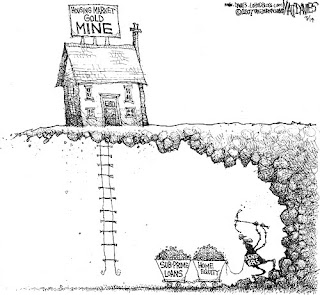 As reported this week in the Wall Street Journal (article available here, with subscription), the Federal Home Loan Bank of Seattle has filed separate lawsuits against 11 different Wall Street firms, alleging that it was misled about the quality of over $4 billion in mortgage-backed securities. The lawsuits, filed in King County Superior Court in Washington, seek to force the firms to repurchase these securities, plus interest. The largest of the lawsuits pits the Home Loan Bank of Seattle against Bear Stearns, Co. (now owned by JPMorgan Chase & Co.) and seeks the repurchase of $719 million in securities bought between March 2006 and September 2007, which feature a foreclosure rate of over 25%, according to the suit.
As reported this week in the Wall Street Journal (article available here, with subscription), the Federal Home Loan Bank of Seattle has filed separate lawsuits against 11 different Wall Street firms, alleging that it was misled about the quality of over $4 billion in mortgage-backed securities. The lawsuits, filed in King County Superior Court in Washington, seek to force the firms to repurchase these securities, plus interest. The largest of the lawsuits pits the Home Loan Bank of Seattle against Bear Stearns, Co. (now owned by JPMorgan Chase & Co.) and seeks the repurchase of $719 million in securities bought between March 2006 and September 2007, which feature a foreclosure rate of over 25%, according to the suit.
Help Keep The Subprime Shakeout Ad-Free!
Blog Archives
Blog Topics
Enter your Email Address
-

Popular Posts
- The Top 5 RMBS Cases to Watch this Summer: No. 5 – Syncora v. EMC
- Breaking News: BofA Close to Reaching $8.5 bn Settlement with BlackRock, PIMCO (100th Post)
- Investor Syndicate At Hundreds of Billions And Growing
- Mortgage Lit Roundup: Five Signs That Plaintiffs Are Winning the RMBS War
- The Government Giveth and It Taketh Away: The Significance of the Game Changing FHFA Lawsuits
- Who’s Watching the Watchmen? RMBS Trustees Come Under Fire as Investors Launch Next Wave of Lawsuits
- FDIC Sues LPS and CoreLogic Over Appraisal Fraud; Shows Investors Leaving Money on the Table
- Top Five Reasons that MBS Lawsuits Are Just Beginning
- Monoline End Games: String of Legal Wins Will Snowball Until Settlement
- $8.5 Billion BofA Settlement of Countrywide Trusts Raises Questions for Investors on Sidelines
Cloud of Recent Tags
allocation of loss appeals Attorneys General Bank of New York banks BofA bondholder actions causes of the crisis Complaints conflicts of interest contract rights costs of the crisis Countrywide damages global settlement Greenwich Financial Services incentives investors irresponsible lending Judicial Opinions lawsuits lenders liabilities litigation loan files loan modifications loss causation MBIA MBS misrespresentation monoline actions pooling agreements private label MBS putbacks rep and warranty repurchase RMBS securities securitization servicers settlements subprime Trustees underwriting practices William Frey-
Blogroll
ZeroHedge
Close preview
Loading...WSJ.com: Law Blog - WSJ.com
Close preview
Loading...The Volokh Conspiracy
Close preview
Loading...The D&O Diary
Close preview
Loading...The Big Picture
Close preview
Loading...The Becker-Posner Blog
Close preview
Loading...The Baseline Scenario
Close preview
Loading...On the Case
Close preview
Loading...Naked Capitalism
Close preview
Loading...Fire Dog Lake
Close preview
Loading...Credit Slips
Close preview
Loading...Calculated Risk
Close preview
Loading...


